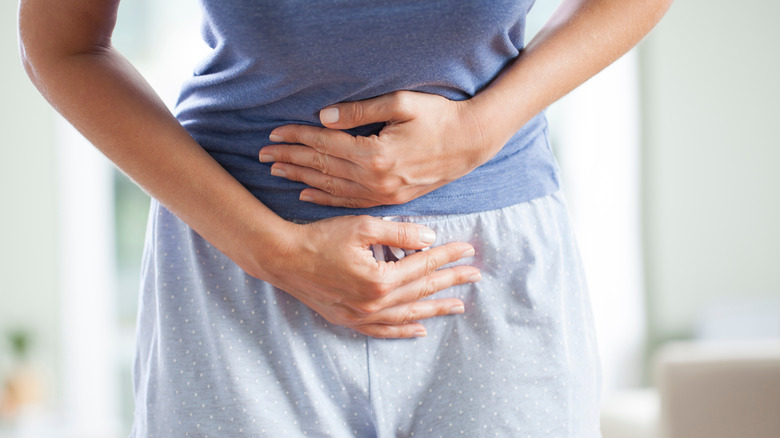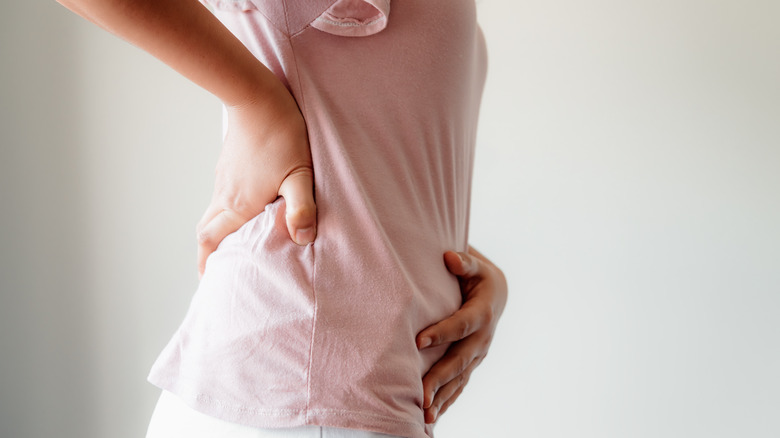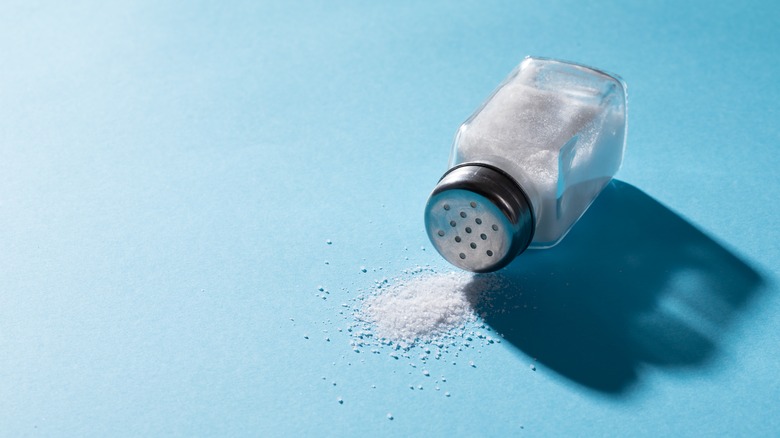This Is Why You Get Bloated On Your Period
As if cramping wasn't enough, periods can be accompanied by a barrage of other unwanted symptoms. Migraines, mood swings, extreme fatigue, and acne breakouts are just some of the issues women have to deal with during their period as well as in the weeks leading up to it. This moment of time is typically referred to as premenstrual syndrome (PMS), which usually occurs between ovulation and your period. According to the U.S. Department of Health & Human Services' Office for Women's Health, it's believed that PMS happens as a result of changes in the two hormones related to sexual reproduction, estrogen and progesterone (via BluePages).
Out of all the symptoms you may experience courtesy of PMS, bloating is often one of the most mysterious. Typically caused by an excess of gas (via the U.K.'s National Health Service), bloating isn't the sort of thing you expect to feel during that time of the month, and it can often make you feel even more uncomfortable than you already were. So how exactly do the two go hand in hand? It actually makes a lot more sense than you may think.
Estrogen and progesterone aren't only linked to the menstrual cycle
Remember those pesky hormones, estrogen and progesterone? They often have an effect on period bloating. According to a 2010 study published in the Exercise and Sport Sciences Reviews, estrogen and progesterone aren't only linked to sexual reproduction; they also control fluid retention and regulation within the body. So as these hormone levels fluctuate before (or during) your period, it can cause your body to retain more fluid and salt, leading to bloating.
According to Healthline, these fluctuations in hormones can also cause you to crave certain foods, especially those high in carbs and sugar. However, other hormones can cause these cravings, too. "Hormones, such as serotonin, decrease when menses start," Oluwakemi M. Edokpayi MD told Popsugar. "These decreases can change your mood, making you crave certain foods. And when you eat certain foods, serotonin and dopamine can be released, thus improving your mood."
More often than not, these treats will include an excessive amount of salt, which can cause the body to hold on to more fluid and therefore result in bloating. While you can't really control how your hormones increase and decrease during your period, you can deal with bloating by keeping an eye on your diet and making some changes.
You can help reduce period bloating by controlling your intake of sodium
The first port of call is to reduce your salt intake. This is easier said than done, as it can be hard to figure out exactly how much sodium is in what you eat. According to media network Gaia, you can still enjoy salty foods as long they don't contain refined salt, which lacks minerals the body needs (via Mayo Clinic Health System). Instead, Gaia recommends sticking to foods with natural salt that "are high in the full spectrum of minerals our body needs," like sea vegetables or "water-rich" veggies such as cucumber or celery (via Web MD).
Another way to reduce bloating through dietary changes is to make sure you're drinking enough water. It may seem contradictory, seeing as you're introducing more fluid into the body. But staying hydrated can stop your body from retaining water. According to Medical News Today, you should aim to drink two liters a day to stay hydrated.


